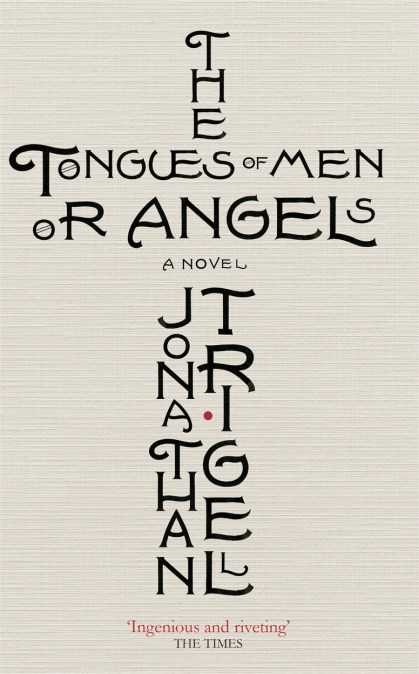After the crucifixion, Jesus’s followers – now led by his brother, James the Just – remained devout Jews, vigorously opposed to the Roman occupiers. But a rival faction emerged, via the charismatic itinerant Paul of Tarsus. Some called him Saint, some called him a liar, but Paul began telling the stories that would transform a small sect of Judaism into a world religion.
In The Tongues of Men or Angels Jonathan Trigell shows the night sky of Biblical-era Galilee lit, not by guiding stars, but by flames of terror. He shows contested soil, on which miracles were performed and battles raged. He shows men of flesh and of blood, by turns loving and brutal. In so doing, he unseals a tale of the ages. The Tongues of Men or Angels is a dazzling act of imagination and learning.
In The Tongues of Men or Angels Jonathan Trigell shows the night sky of Biblical-era Galilee lit, not by guiding stars, but by flames of terror. He shows contested soil, on which miracles were performed and battles raged. He shows men of flesh and of blood, by turns loving and brutal. In so doing, he unseals a tale of the ages. The Tongues of Men or Angels is a dazzling act of imagination and learning.
Newsletter Signup
By clicking ‘Sign Up,’ I acknowledge that I have read and agree to Hachette Book Group’s Privacy Policy and Terms of Use
Reviews
The Tongues of Men or Angels is Jonathan Trigell's bold attempt at an ironic, modern retelling of the events surrounding the crucifixion and Paul's subsequent evangelising of his version of Jesus's message... an ingeniously structured, lively narrative of the birth of Christianity.
This ambitious book by Jonathan Trigell captures the battle for the soul of the early church ... the best of it ranges from thought-provoking to stunning. Trigell is superb on capturing the blood, dung and superstition of Judea in the 1st century AD.
Trigell is a very good writer - and also knows his text inside out. This really helps, because it gives him a very rich support cast: Philemon's slave is a fictional triumph, really well fleshed out from the scanty available evidence.
This often very subtle and creative cross-referencing adds a sort of intellectual game, as a bonus (although I suspect the novel would work perfectly well for those who did not identify the detailed sources), but also more seriously gives a surprising authority to the novel.
It underpins what must be Trigell's greatest achievement: he has created a Saul/Paul (with back-story, complexity, real psychological depth) who might actually have written the epistles - welding that extraordinary mixture of commitment, self-righteousness, touchy insecurity, surprising moments of sweetness, and mystical passion into a single coherent character.
Trigell's version is ingenious and riveting. He is brilliant in his recreation of the visceral baseness of being human; this is a Judea mired in dung and blood and superstition.
The Tongues of Men and Angels is an insightful and gripping account of the early church, without any of the symbolic trickery of a Dan Brown. Trigell has researched his subject thoroughly and fairly, and is able to reinterpret events in an interesting light... a lively, engaging, ambitious, nuanced and thought-provoking novel
Trigell's fourth novel is a high-octane take on the post-Crucifixion schism that emerged between Judaism and Christianity amid the brutality of Roman rule. Written with an inventive wit and verve, this is an impressive distillation of the Christian myth in the earthy poetry of the everyday vernacular; his portrayal of the Crucifixion is particularly visceral... a bravura and original performance.
"The settings and events are described in such muscular yet sensuous language that you almost feel you're there."
a committed attempt to compare the harsh reality of Jesus's life with the embroidered versions that spread following his death... This is a story that invents in order to see through invention
This daring novel tells the story of Jesus and his followers in the years leading up to and following the Crucifixion. Trigell's interpretation of the origins of Christianity, particularly the factional struggle between the disciple Cephas (Peter) and the convert Saul (Paul), will spark controversy, but there's no denying the raw powe rof the writing.
